This is a previously unreleased recording that was part of “Trading Trump” series of video content from November 2024 - post-Trump election win. The reason I didn’t include this within the original series is because, at the time, I viewed my dive into Prime Minister Ishiba himself as relatively less-relevant. The reason I am releasing this now is because only in (real-time) retrospect does its prescient relevancy reveal itself.
This recording should be (re)watched with Part 3 of the “Trading Trump” series:
The Greatest Trump Trader In History: Prime Minister Shinzo Abe
The strength and stability of the U.S.-Japan economic alliance and relationship is one of those givens that the world takes for granted, particularly during President Trump’s first term in office - when practically every sovereign nation or economic bloc, ally of the U.S. or adversary, had to rethink their own respective relationship and standing with t…
From “How Asia Is Guiding Trump Tariff Policy & Markets” published April 16, 2025:
Over the past few days, President Trump’s approach and public rhetoric around striking a trade deal with Japan has soured.
We all seem to observe and approach anything Donald Trump does as something that originates from Donald Trump - good or bad, positive or negative, for better or worse - its always a “Trump thing.” And for obvious reasons - because Trump is the one who makes these headlines possible.
That said, not everything is a pure result of Trump himself. And in this case of this “sudden” sharp deterioration of this US-Japan trade (and potentially more) “deal” and relationship - we need to look at the other side of the negotiations: Japan, and specifically Prime Minister Ishiba.
Before going further, let me just state 2 things very clearly and explicitly up front.
Yes, Donald Trump is the reason behind Donald Trump’s various actions and behaviors - including the Trump tariffs. Don’t overthink this one - it’s just a very straight forward and pretty fucking obvious statement - Trump is the reason there are Trump tariffs currently underway. I say this because inevitably there will be some proportion of those who will watch / listen to my very highly appropriate skewering of how the Japan side handled these negotiations, and have their primary takeaway being “yeah, but Trump is also a factor / at fault.” Yeah, no shit - he’s a grown man and is responsible for his autonomy. The reason for this article and video is not to further add to “look what Trump did” - its to shine light on what else is happening outside of the global attention black hole that is Donald Trump. In this case - we need to discuss how Japan PM Ishiba has very gravely (and predictably) misplayed Japan’s hand, and any ruptured US-Japan relations and outcomes rest as much on Ishiba, if not more so.
I am not a “defender” of Trump any more so than I am a supporter of Trump. And as someone who religiously practices completely detaching any personal political preferences from my role in understanding and explaining the world of green and red blinking tickers very seriously, and take much pride in earning my reputation for doing so, it is for this very reason that I freely and colorfully do my very fair share of calling / calling out Trump (OR ANYONE - like clown-PM Ishiba) when they do and say stupid shit, without worrying about compromising my religious objectivity. Trump says a lot of stupid shit, and often - but it is not unconditional. And also often, Trump will say something that everyone jumps on without even bothering to see the far more significant big picture. This article and video is me providing the full picture.
This “Mr. Japan” quote is a perfect example. Over the weekend, Trump had basically ended trade negotiations with Japan, and referred to Prime Minister Ishiba as “Mr. Japan” - see 1 min clip of his interview with Maria Bartiromo below.
Not a monolith, but a flood of media and commentary everywhere ignited in bashing Trump saying “Mr. Japan.”
Dear Mr Japan? Trump’s tariff letter opener sparks mockery and memes on social media
'Brain is peanut butter': Trump mocked for calling Japanese leader 'Mr. Japan'
'Insane': Trump's Baffling New Comments On Japan Leave Critics Aghast
Which is all fine and dandy - but again, is completely missing the big picture, and is therefore useless commentary.
Be honest - if not for me mentioning his name several times above - would you yourself know who the Prime Minister of Japan is by name, off the top of your head?
No, you likely wouldn’t. And it wouldn’t be your fault if not - and it’s not Trump’s fault either. Because if I ask if you know who Emmanuel Macron (or Kier Starmer, or Narendra Modi, or Xi Jinping, or Mohammed bin Salman) is - you would very likely know all of them, and more. Not because you studied up on world leaders’ names- but because, as primary figures of modern history leading major global powers, these people are unavoidably present in global affairs.
So, if you are the Prime Minister of Japan, and a United States President, be it Donald Trump or otherwise, doesn’t know your name off the top of his head (or at all), then it is not Donald Trump’s problem - it is YOUR fucking problem, Mr. Japan. Trump not knowing who Weston Nakamura is isn’t anybody’s fault - neither mine nor Trump’s. I am a nobody, and he is the world’s most famous individual, for which every other important person in the world needs to get into his orbit.
But if you’re Japan Prime Minister Shigeru Ishiba, and Trump refers to you as “Mr. Japan” - and the reason he’s even talking about you at all is because in that same sentence he is talking about cutting off trade talks with the country that was given the red carpet treatment of being “first/highest priority” to get a deal done, then its no wonder those very trade talks are now over. You, Mr. Japan, have done nothing - not “done nothing to advance trade talk progression,” I mean you have done nothing to somehow not make your presence known with your massive platform, period. It isn’t Trump who should be ashamed about “Mr. Japan” by any means - it is “Mr. Japan” himself. (And by the way, the problem I have with calling Ishiba “Mr. Japan” is that he doesn’t even deserve that title.)
And one last point on this, just in case some of the criticism ventures into “uncultured” or even “racist” (or at least “doesn’t show respect for making efforts to familiarize with non-western names) - you know who Donald Trump can’t shut up about? Shinzo fucking Abe. That’s a 100% pure Japanese first and last name (and a last name that Americans are predisposed to pronounce as “Abe Lincoln” rather than “ah-BEY”). Shinzo Abe has been dead for years, yet, Trump can’t forget the name Shinzo Abe. It’s not that Trump forgot Ishiba’s name, it’s that Ishiba never entered his head to then be able to forget in the first place.
So, Shigeru Ishiba, the embarrassment is completely on you. And FAR more important - the trade deal that never went anywhere to even “fall apart” from - that’s also on you, Mr. Japan.
Watch the video in this piece, and then revisit this whole “Mr. Japan” thing, as well as the broader US-Japan trade deal implosion, and all of it will then make complete sense - provided you are not incapable from seeing anything other than “Trump = unconditionally at 100% fault,” or, an unconditional Ishiba supporter (and if you are the latter - brace yourself for some harsh realities).
Finally, it may seem hypocritically contradictory to proclaim myself as politically neutral in my analysis while criticizing PM Ishiba and incessantly calling him a clown - but what I am in fact doing is simply expressing what my objective findings are in an exuberantly colorful manner, as per my peronality and natural style of communication. Was I incorrect in my view of Ishiba’s competency and capability to forge a relationship with the US president? Go ask the polled domestic public to rate their approval / disapproval of Mr. Clown Japan and you’ll find that my findings and conclusions of him being a self-interested clown are not only objective, but accurate.
Additional commentary to add to the video
Given the video was originally recorded back in November, before Trump’s presidency began (let alone Liberation day and reciprocal tariffs and 90-day postponements and everything else currently underway) - obviously nothing in that video is addressing the actual situation at hand (though again, I must say that my general framework was pretty spot-on). So, the following are some pieces of follow-up commentary.
First just a footnote from the video itself on this slide:
For clarity, I should mention what the significance of Bob Lighthizer and Bill Hagerty are in Trump 2.0, respectively.
Lighthizer himself is not an official member of Trump’s team this time around - but the US Trade Representative for Trump Administration 2.0 is currently Jamieson Greer, who was Lighthizer’s Chief of Staff during the first administration, and had also worked directly with Lighthizer throughout - and therefore, also has/had personal ties with Abe, Motegi, Sugiyama, Aso and Kono himself. Greer is currently elevated to as senior level in trade negotiations as Commerce Secretary Lutnick and even Treasury Secretary Bessent are.
Bill Hagerty, then-US Ambassador to Japan, is currently a US Senator from Tennessee. Hagerty has a private sector background in finance, and even worked private equity based in Tokyo before public service. He was elected to the Senate after his ambassadorship serving Trump 1.0 in Japan, and at the time of this video recording post-Trump re-election in 2024, was one of the names being floated for Treasury Secretary and Trade Representative, but ultimately chose to say in the Senate, where currently sits on the Senate Foreign Relations and Banking committees. And again - he has very close ties with senior LDP officials (ex-Abe administration), but nobody from the current Ishiba administration.
How did Japan go from “priority #1” to “spoiled country with a letter of 40% tariffs coming” just a few days prior to the July 9th deadline?
First and foremost, if you are named very publicly, and then actually treated as “US priority #1” - then that extremely envious starting point that none of the 90 other nations scrambling to make a deal with the White House is yours to lose, Japan. Again, yes, obviously this is “Trump’s fault” for imposing Trump tariffs to begin with. But everybody was tariffed, and nobody had the starting advantages that Japan did. So there really is no excuse on Japan’s part for this to fall apart.
Upon Liberation Day, rather than utilizing existing Abe administration relationships, PM Ishiba instead named a completely unknown (nationally, let alone internationally) member of his cabinet (with already way too many ministerial roles as is) Ryosei Akazawa as Japan’s chief trade negotiator. Here is his profile - note that none of the “Minister” roles listed include being the Japan trade rep, and all of them are current active roles (not some chronological resume).
So, why in the hell did PM Ishiba assign this guy, this already very busy guy, instead of any of those others with experience, personal relationships, and time on their hands, to be the nation’s representative counterpart to Treasury Secretary Bessent, Commerce Secretary Lutnick and USTR Greer within a Trump 2nd term administration - which would arguably be the most critical and immediately urgent appointment of Ishiba’s tenure thus far? Why Akazawa?
Because of what I circled in red in his profile screen shot above - the Tottori district.
Both Ishiba and Akazawa come from Tottori. Tottori is the least populated district in Japan. It is “known for” (has) literal sand dunes.
That’s why Ishiba not only chose Akazawa, but did NOT choose the other experienced and senior members of his party to lead Japan in trade negotiations - because they’re both from Tottori.
Also important to note about Tottori - it is a rural district, and primarily agricultural - rice farmers. Rice farmers. Also known as - the lobby who will ultimately ruin the greater good of Japan’s export industries - namely its critically coveted automobile sector.
Here is the full passage from my first post-Liberation day commentary published on April 16th, when Japan was named as priority #1 for a deal, and
https://westonnakamura.substack.com/p/how-asia-is-guiding-trump-tariff
Regarding these specific US-Japan negotiations, while everyone’s focus will primarily be on autos, I would say - watch for anything on rice tariffs for a potential “win-win,” or a lost opportunity. The White House is claiming Japan has an egrigious 700% tariff on US rice imports. Japanese commentators are saying that is clearly a ridiculously untrue figure. I haven’t looked into the depths of this (because its pointless to do so if basic realities aren’t agreed upon to start), but the truth seems to be somewhere in the middle - Japan does indeed tariff rice imports at 700%, but only tariffs a certain proportion of its imported rice, and those figures are based on past statistics for which the government doesn’t release (Nikkei says the current rice tariffs are “merely” 400%).
My view - who gives a shit about whether or not the 700% rice tariff is real - it sets up for an easy win-win, and one that the US may have intentionally teed up heading into these global “make-or-break” first negotiations.
Recall my January 2025 Bank of Japan “rice rate hike” coverage - in which BOJ cited soaring rice prices as a reason for hiking rates in January - as there is indeed a severe rice shortage currently in Japan, such that the government has to tap into its rice reserves to alleviate record high rice prices. Japan needs rice. US wants to export more rice to Japan without a 700% tariff. US knows Japan is facing a rice shortage. So, if the US is claiming there is a 700% tariff on rice imports to Japan, and the figure isn’t even real, then Japan just needs to pretend the figure is real and “drop” its rice tariffs down to whatever the current real figure it is - provided that it is indeed a far lower figure. Japan gets its much needed rice, Trump gets a big headline win on tariff negotiations, win-win.
The only loss here would be a symbolic one against Prime Minister Ishiba, who has this long standing reputation for always “fighting for the forgotten rural population” - farmers. Rice farmers. Japan’s long ruling LDP party has indeed held very protectionist trade policies for Japan’s rice farmers in particular - this was even a point where then-king-of-Trump-trading former PM Shinzo Abe had essentially begged Trump 1.0 to let the rice tariff issue go (and he did), because the domestic blowback from those constituents is perceived to be that politically critical. And given how generally incompetent PM Ishiba is, both in reading domestic politics as well as in international relations, I suspect that Ishiba may not see the bigger picture trade-offs of giving in on rice tariffs to save a broader trade deal that includes the likes of automobiles, and may very well miss this US-given layup. In which case, the headlines, both domestic and international, will read that Japan refuses to budge on “700% rice tariffs” and nukes the broader US-Japan trade negotiation. And Bessent moves on to South Korea.
Also regarding this “700% rice tariff” accusation / reality, I actually think that this may be an example of a broader tactic that is potentially being used within the Trump administration - one in which the US is potentially knowingly and purposely throwing out outlandishly nonsense figures of “unfairness” at each (or certain) countries that may or may not be rooted in fact (but which Trump himself is shown, and believes) - to then “negotiate down” from, and basically end up with some massive on-paper improvement that Trump can tout as the product of successful dealmaking, but doesn’t actually shake up the status quo of global trading, and thereby averts sudden and extreme breaks in global commerce.
Or not.
The Tottori duo leading Japan’s response to Trump tariffs is where I got this “rice trouble ahead” from. That, combined with my recognition that PM Ishiba clearly has poor judgement, as well as his self motivations will blindly skew towards prioritizing rice farmers over anything and everything else.
And sure enough, it seems that after seven (yes, seven) separate trips made by Akazawa from Tokyo to Washington for in-person meetings with a very busy US Treasury Secretary, and a very mouth-foaming Commerce Secretary Lutnick - Trump shut the door on trade talks with Japan because of Ishiba’s refusal to budge on rice imports.
As I (and subsequently, Trump) stated: the US knows Japan is suffering a shortage of rice, and is in need. So, I repeat - I strongly believe that this had to be intended by the US as a set up for an easy win-win, and no-brainer deal-done by the Trump administration. The only problem for the Trump administration using this approach is their assumption that Japan’s political leadership will not just act in their own interests, but will act rationally to best serve their own interests. And they assumed wrong.
Japan is suffering from skyrocketing rice prices that are hitting record levels, more than doubling year-on-year - and that’s if it’s even available for purchase amidst bare shelves at stores. Rice prices are even contributing greatly to nationwide inflation.
Japan does indeed have protectionist policies around domestic rice production. In fact, domestic rice production is a completely top-down government controlled “market.” It actually is as close to something along the lines of genuine communism that I’ve ever been personally aware of within an otherwise capitalist market-economy. Government takes non-free-market actions to control rice production and supply, such that rice farmers operate in an artificial price-discovery dynamic, which helps keep their revenues and incomes stable. They can even pay farmers to not produce rice. And the national government warehouses emergency rice stockpiles, which are currently being released and sold at regulated auctions. And yes, foreign rice is tariffed after a certain quota limit is hit. The Japan domestic rice market is not communism in the sense that it’s government produced and distributed - but it is as highly top-down controlled as any free consumer market I’ve ever seen.
I don’t mean to use the communism label in some sort of disparaging way - quite the opposite. Because Japan’s domestic rice market is so heavily reliant on central government regulating activity, it would therefore be far easier to deal with in international trade- because it’s not as if they have no control over private flows of stock.
And I think the Trump administration also saw it this way. Because, whether the Trump administration realizes or not (and obviously they do, they’re far smarter than I am), ultimately in global commerce, these trade deficits / surpluses aren’t matters that are up to governments to adjust. You can tell some elected head of state that their country needs to buy more Fords, but if the citizens don’t want to buy them, then there’s nothing that government can do about it.
But that’s not the case for Japanese rice - it absolutely is government that can pull the strings of import supply, which I think Trump administration understands. They also understand that the rice shortage has gotten so severe and domestic prices so high, that Japanese importers and consumers are now buying foreign rice, and paying the tariff to do so, because it’s still cheaper than buying domestic.
KYODO: Supermarkets offering foreign-grown rice as Japan faces record prices
Aeon Co. will start selling California-sourced rice on June 6 at its stores, mainly in urban areas, at 2,894 yen ($20) for 4 kilograms. Converted to the more common Japanese sales unit of 5 kilograms, it is 3,618 yen, some 15 percent cheaper than the average price calculated by the farm ministry of Japanese-grown rice at supermarkets nationwide in early May.
The company already launched a blend of U.S.- and domestically-grown rice in April. Rival food retailers Ito-Yokado Co. and Seiyu Co. have also sold rice from California and Taiwan, respectively, and seen solid demand.
So, like I keep saying, this is an easy win for all parties - at least one would think.
Domestic rice supply doesn’t exist in Japan - so importing foreign rice is not “screwing” the protected class of domestic rice farmers - because they’re unable to provide supply anyway. The little domestic supply that does exist is pushing inflation higher. And foreign imports that are subject to tariffs are in demand due to all of this. So, why not just drop the rice tariffs, and provide price and supply relief to the population, which wouldn’t compete with domestically produced rice farmers under the current circumstances anyway - and maybe use this reduction of unnecessary tariff costs paid by Japanese consumers as a means to save the automobile industry (and other export industries) from US tariffs, in a genuine win-win deal?
Seems like this could be agreed upon instantly- on April 3rd following Liberation Day. Yet, Minister Akazawa and his 7 trips around the planet back and forth from Ishiba’s office to Bessent’s office produced no such outcomes.
Why not?
Because, for the thousandth time, PM Ishiba is a massively incompetent clown, who somehow thought that net-net on balance, remaining meaninglessly but symbolically protectionist on behalf of rice farmers (who themselves are probably hungry for foreign rice as they gaze across their barren rice fields), even at the expense of the rest of the entire Japanese export economy, not to mention pissing off its most powerful ally at the very start of a new administrative tenure, would somehow produce better Upper House election results for Ishiba’s LDP on July 20th.
Poor Akazawa had to keep physically going to D.C. just to sit there in front of Bessent, Lutnick and Greer, and say “we demand you drop all the auto tariffs and we won’t budge an inch on rice imports.”
So, what the fuck do you expect would happen, Ishiba? Are you genuinely surprised about this “sudden” shift in attitude from Trump? The thing is- yes, he / they likely are surprised. Either way, they still don’t seem to get the message.
That’s Chief Cabinet Secretary Yoshimasa Hayashi in response to Trump closing a wide open door of opportunity to save the auto industry from crippling tariffs, STILL saying Japan won’t “sacrifice” its rice farmers.
“Sacrifice?” What in the fuck are you talking about? Japan’s rice farmers are not producing rice at the moment. The Japanese public (who make up far more in votes than Tottori’s rice farmers) are demanding rice, and are paying up for it. Explain to me / your country how dropping tariffs on California rice imports that are being ordered anyway is sacrificing anything.
Does this Trump quote and attitude now make more sense in context?
“Countries have grown too spoiled by the United States. Japan, a country I respect, refuses to buy our rice—even though they’re facing shortages.”
Yes, I can certainly understand the U.S.’ aggregation towards Japan’s seeming unwillingness to make any deal and wasting the Treasury Secretary’s valuable time.
If this all seems just too stupid to you - here is one last theory to explain Ishiba’s stance (until now). Ishiba, as I’ve stated, is obsessed with having the Prime Minister title. He is also seeing his approval ratings get deservedly decimated since the moment he took office, down to ever record lows.
But, he has also been observing a phenomenon occur in countries like Canada and Australia - in which an incumbent party facing elections with rock-bottom approval ratings has its leader take a “tough stance against Trump” - and then turn the tables around to ultimately win. I think Ishiba is trying to pull this move as well. But, as I explained with
- Japan’s public opinion culture is different from those other peer democracies. Whereas the rest of the world is turning (understandably) anti-American / “fuck Trump,” and rewards those who stand up against him, and for their respective countries - Japan’s public doesn’t look at Trump himself as the party to blame for these woes - he just is the entity that he is. Instead, the Japanese public by and large turns to its own government which it elects or unseats, and says - ok, so what are you/we going to do about it? And not some empty nationalistic symbolism - we mean, what are you going to actually do to improve our daily livelihoods?Ishiba is too tone deaf to be able to execute on serving his own self interests.
Going forward, I think we will see some attempts to backpedal, because I think that Ishiba truly got thrown off guard. Perhaps because Akazawa kept retuning from Washington and not converging the real picture to Ishiba - drop our fucking rice tariffs, because the Trump administration is out on a limb for Japan to succeed in a deal, and if we can’t cooperate, then Trump will do what’s necessary to preserve his own optics.
So, I think we will see Japan make attempts to get back to the table in the coming days, but they will not move on rice. There may be another extension of time, but rice is (no pun intended) off the table. And ultimately, this will only continue to sour and damage US-Japan relations, regardless of any cosmetic “trade deal.”
While that may not be good for Japan in the immediate to near term (let’s see how July Upper House elections go / how long Ishiba keeps his job for), Japan getting the door slammed shut is bullish for Korea, India, EU, and even for China and their respective deal prospects with the US, because:
If Japan is dead to Trump, then why not make an example out of it for what happens if you fuck around and just waste time
No deal with “highest priority Japan” forces the Trump administration to ink something, anything, with others - and to their benefit.
The Trading Trump Series:
The Greatest Trump Trader In History: Prime Minister Shinzo Abe
The strength and stability of the U.S.-Japan economic alliance and relationship is one of those givens that the world takes for granted, particularly during President Trump’s first term in office - when practically every sovereign nation or economic bloc, ally of the U.S. or adversary, had to rethink their own respective relationship and standing with t…
Trading Trump (1) - America’s Largest Foreign Investors And The “Trump Trade”
This is part of a broader analysis on the US elections and market implications through the perspective of Asia / Japan.
Trading Trump (2) - Bond Markets
This is part of a broader analysis on the US elections and market implications through the perspective of Asia / Japan.
On a separate but related note - coming soon is a major piece of work:
“Bond Yields Under New Management”
Bank of Japan tapers tapering, while Ministry of Finance cuts issuance. The JGB baton hand-off is underway - with major implications on global fixed income markets.
Which is a full analysis on what is an incredibly significant and historic shift that is currently underway regarding Japan’s attempted management of long-end JGB (and thereby UST) yields, to follow up from my previous release “World's Most Dangerous Market: JGBs”
Coming soon so stay tuned - and thanks as always for your ongoing support.
Weston

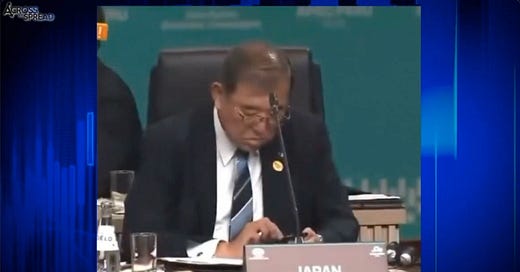





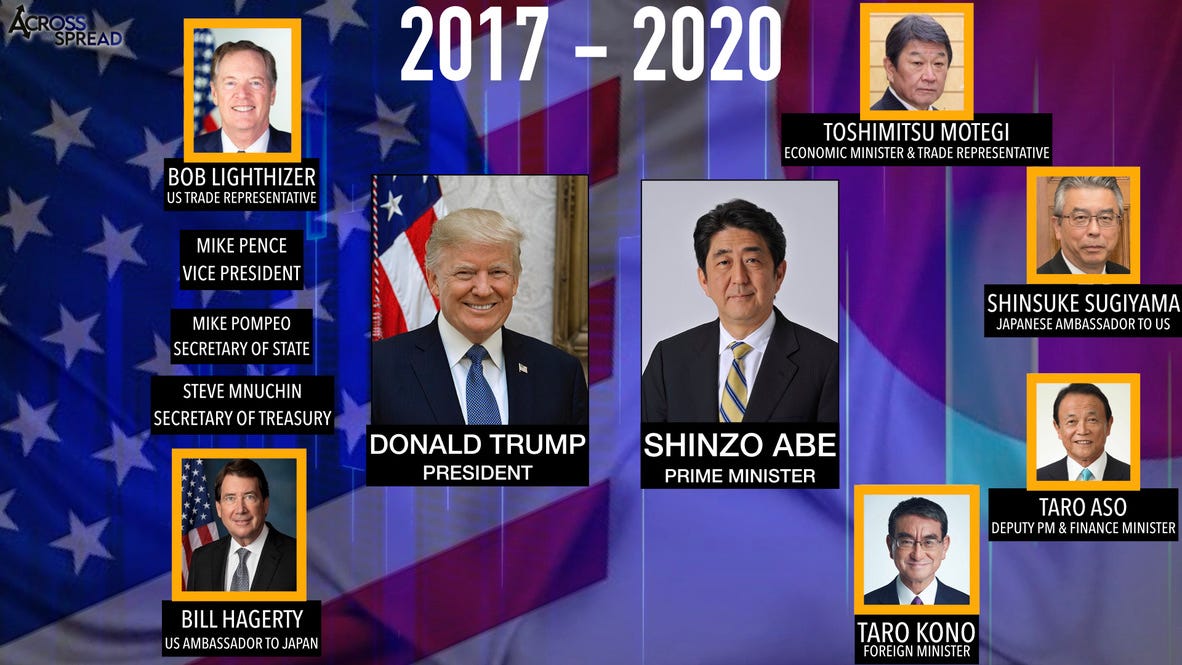
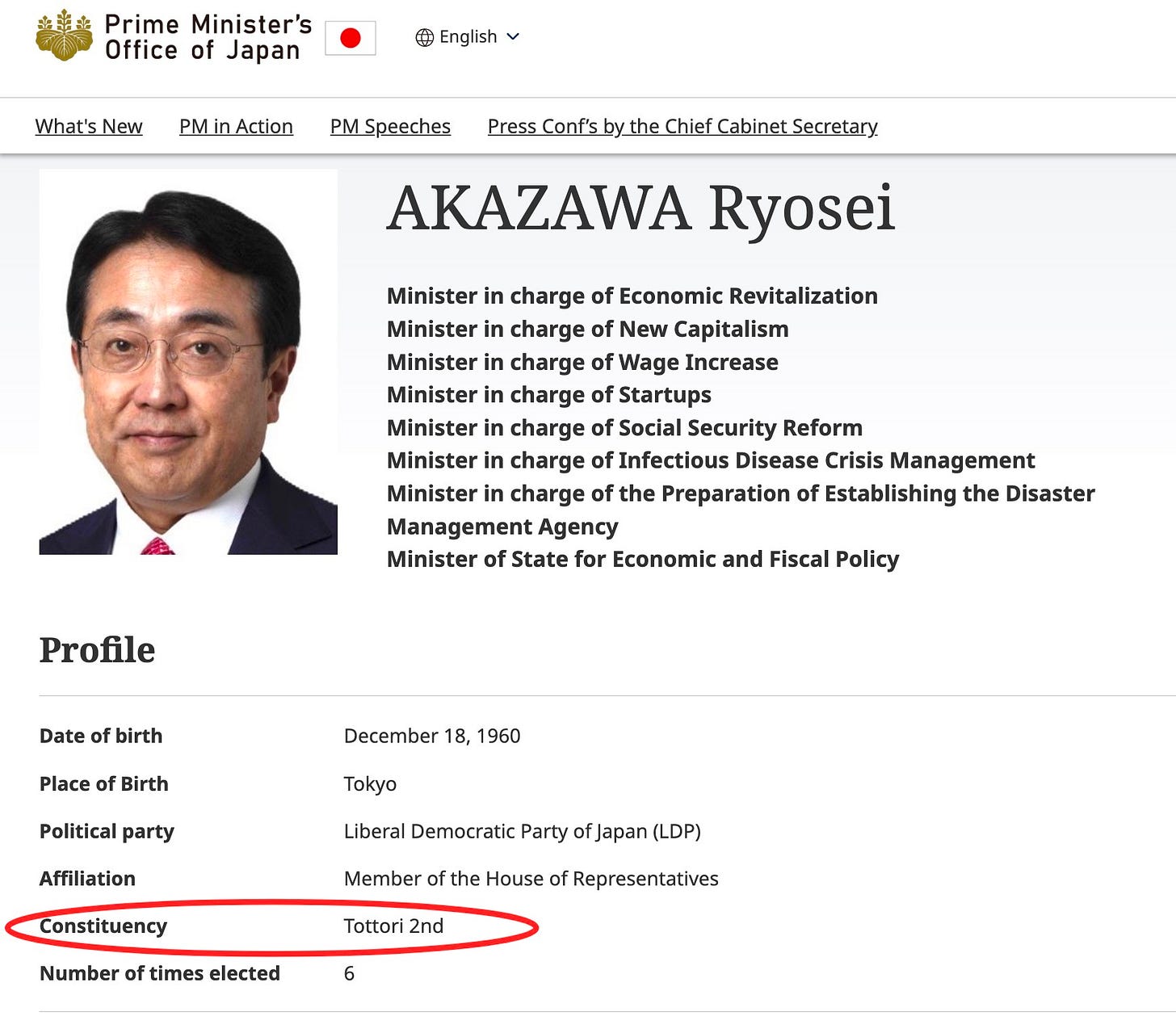





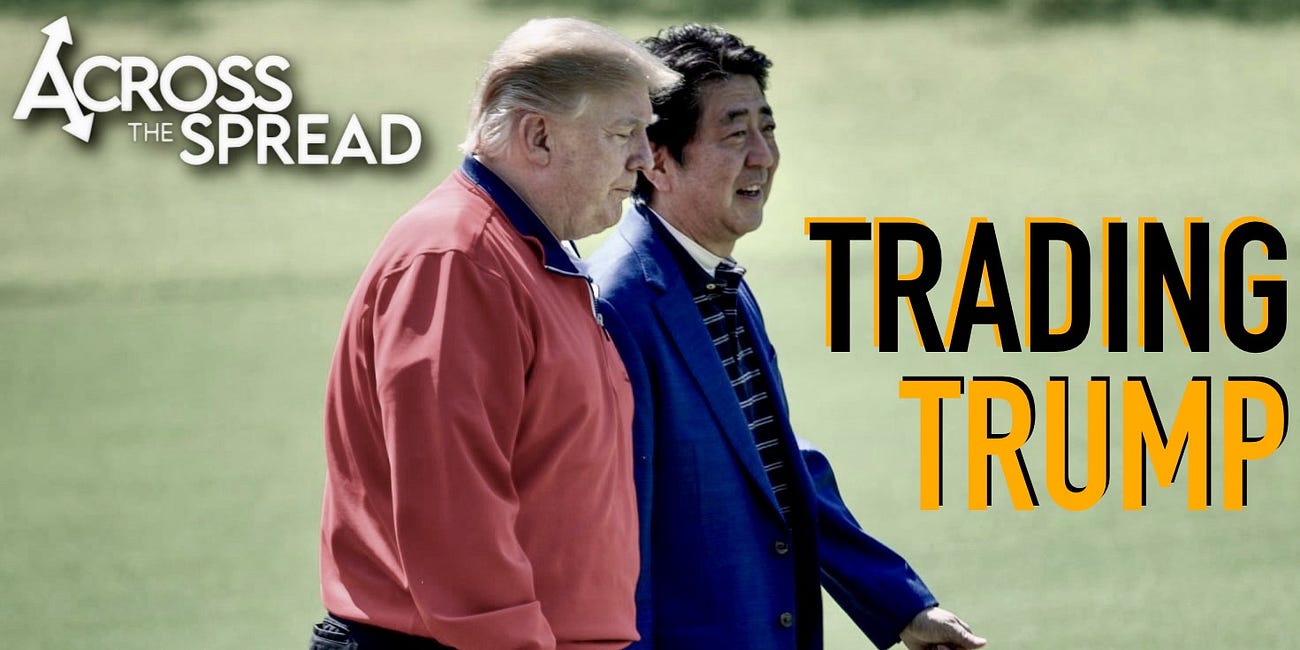






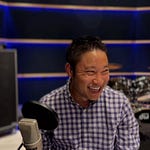




Share this post